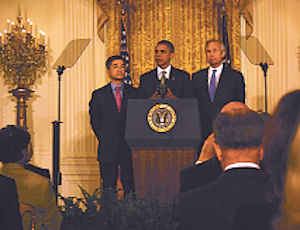When President Barack Obama addressed a group of businesspeople on his administration’s policy to increase exports among those in the audience was Larry DeBord of manufacturer Medical Illumination. The San Fernando-based company does up to 35 percent of its business overseas, so DeBord was particularly interested in what Obama had to say when it came to trade barriers and how Washington would work to reduce them. “They really gave us the impression they are serious to beef up exports,” said DeBord, the vice president of sales and marketing. The visit to the White House came about fairly quickly for DeBord. He was given two days notice that he was among the representatives of the 150 companies to be invited to the briefing on July 7. U.S. Commerce Secretary Gary Locke opened the meeting, followed by the president who provided an update on the National Export Initiative that he first announced during his State of the Union speech in January. In the first four months of the year, U.S. exports had increased by 17 percent when compared to the same period in 2009. This improvement contributes to Obama’s goal to double U.S. exports within five years, the White House said. Other progress to meet goals of the initiative includes 18 trade missions coordinated by the Commerce Department to 24 countries in which more than 160 U.S. companies took part. The administration also convinced China to once again open its market to pork and pork products, and for Russia to allow U.S. exports of poultry. The White House estimates these steps will bring in $1 billion in business to U.S. companies. With Medical Illumination selling its medical lighting equipment, operating room tables and equipment management systems to overseas customers, DeBord is keen to see trade barriers fall. Brazil, he said, is a great example where taxes are stacked one on top of the other so that it keeps American products out. In the overseas markets, China is the biggest for Medical Illumination, followed by Latin America and then the Middle East. It was not by design the company wanted to start exporting but simply gravitation toward emerging markets. “It is the way it has worked out,” DeBord said. “If we were going to grow the thing was to become international. We started working trade shows. We have been very fortunate.” Obama also used the briefing to announce his appointees to the President’s Export Council. Among the appointees was Robert Iger, chairman, CEO and president of The Walt Disney Co. From TV to War The crew at Isolated Ground usually fills their work days putting together sets used for television commercials. A new project that came the Glendale company’s way from a defense contractor now has Brian Shipley and his team designing and building trainers for the military to teach about the dangers of improvised explosive devices, or IEDs, the weapon of choice by enemy forces in the wars in Iraq and Afghanistan. A-T Solutions, in Virginia, received an $8.9 million contract for the trainers to be used by the U.S. Army and Marine Corps., with much of the work sub-contracted out to Isolated Ground. The mobile training consists of four containers, each designed to look different and teach about identifying IEDs, why and how insurgents use them and tactics used to avoid their dangers. The training is aimed at junior enlisted men and officers with limited exposure to counter-terrorism methods. The job came Shipley’s way from a production designer he knows who had been hired to do the interior finishing. Building the containers uses the same skills and talent levels as in building a commercial set, Shipley said. One of the containers represents a Third World dwelling where the roadside bombs are being made; a representation of the wartime conditions the soldiers and Marines will encounter. “That puts them in the environment they are going to experience so when they are there it is not the first time,” Shipley said. For now, the military contract work is still small enough to handle and Shipley will continue to do it as long as it does not become overwhelming on his business. Missile Work ATK Defense Electronics Systems in Woodland Hills did work on the advanced a nti-radiation guides missiles recently delivered to the U.S. Navy. The missiles are capable of destroying enemy air defense systems, time-critical targets, and other mobile targets. The weapon can be launched from the F/A-18 Hornet and Super Hornet, the EA-18G and is compatible with the F-35 Lightning II. Creating Jobs Services provided by California Manufacturing Technology Consulting helped retain existing jobs and create new ones, according to a survey of manufacturers in Southern California. The survey compiled information provided by more than 600 small to medium sized manufacturers on business done between July 1, 2009 and June, 30, 2010. Consulting services from CMTC contributed to the companies seeing a $68 million increase in sales and $234 million in retained sales. Staff Reporter Mark Madler can be reached at (818) 316-3126 or by e-mail at [email protected].
